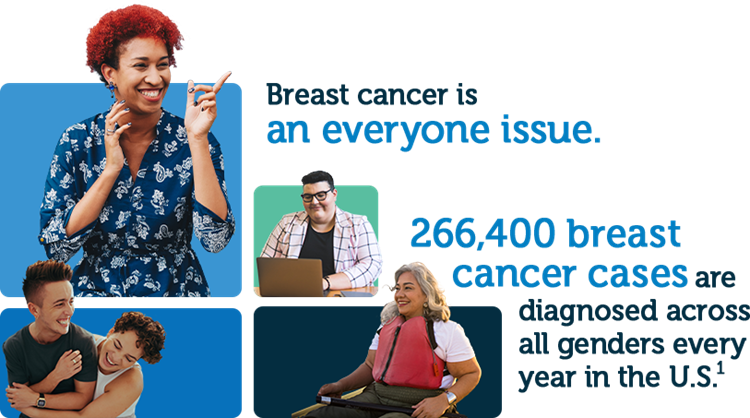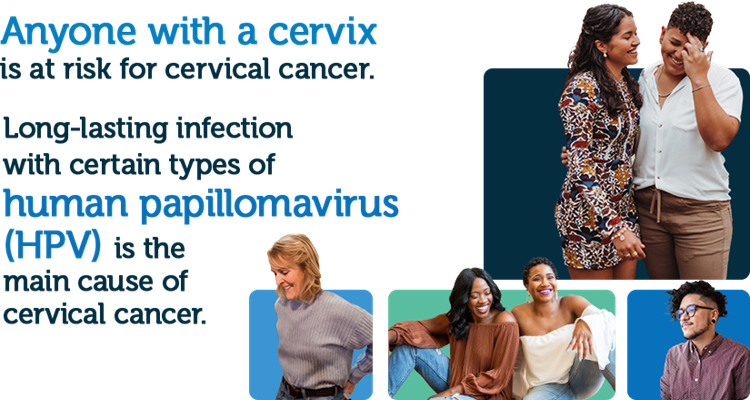
Cancer can affect anyone, which is why it’s so important to get screened. Screening plays a vital role in early detection and increases chances of a successful treatment and recovery. We’re here to help everyone get the screenings they need so they can lead a healthy life.
Breast Cancer Screenings Cervical Cancer Screening Colorectal Cancer Screening
Lung Cancer Screenings Other Cancer Screenings
Breast Cancer Screening
Anyone can develop breast cancer. The standard screening test for breast cancer is called a mammogram. It uses X-rays to take a picture of the inside of your breast. Mammograms are the best way to find breast cancer early when it is easier to treat and before it is big enough to feel or cause symptoms.

A more comprehensive screening may be needed for people who are at higher risk for developing breast cancer. Talk to your doctor about which breast cancer screening test is right for you, and when and how often you should get screened.
Many health insurance plans cover preventive care like breast cancer screenings at low or no cost. If you do not have health insurance or have a high deductible health insurance plan, there may be community resources available to you.
To find out if you qualify for a free or low-cost mammogram and where to get one,
contact us: Team@cedpp.org
See the list below for local screening programs and healthcare providers.
| The Connecticut Department of Public Health, 860-509-7804 or Town |
Location |
Phone |
| Bridgeport |
Bridgeport Hospital |
203-384-3392 |
| Danbury |
Danbury Hospital |
203-739-4770 |
| Hartford |
Hartford Hospital |
860-972-3078 |
| Hartford |
St. Francis Hospital |
860-714-7151 |
| Meriden/Middletown | Central Region Hartford Healthcare Early Detection Program |
860-972-5775 860-972-1900 |
| New Haven | Yale New Haven Hospital |
203-688-2219 |
| New London |
Lawrence and Memorial Hospital |
860-442-0711 x2197 |
| Torrington |
Charlotte Hungerford Hospital |
860-496-6513 |
| Vernon |
Eastern CT Health Network |
860-872-5368 |
| Waterbury |
St. Mary’s Hospital |
203-709-3873 |
| Willimantic | Windham Hospital |
860-972-3078 |
Cervical Cancer Screening
Cancer is always named for the part of the body where it starts, even if it spreads to other body parts later. When cancer starts in the cervix, it is called cervical cancer. The cervix connects the vagina to the upper part of the uterus.

HPV is a common virus that is passed from one person to another during sex. At least half of sexually active people will have HPV at some point in their lives, but few will get cervical cancer. Screening tests and the HPV vaccine can help prevent cervical cancer or find it early. Screening tests include the HPV test and a Pap test.
- The HPV test looks for the human papillomavirus that can cause cell changes on the cervix.
- The Pap test (or Pap smear) looks for precancers, cell changes on the cervix that might become cervical cancer if they are not treated appropriately.
When cervical cancer is found early, it is highly treatable and associated with long term survival and good quality of life. Talk to your doctor about which cervical cancer screening tests are right for you, and when and how often you should get screened.
Many health insurance plans cover preventive care like cervical cancer screenings at low or no cost. If you do not have health insurance or have a high deductible health insurance plan, there may be community resources available to you.
To find out if you qualify for a free or low-cost PAP test and where to get one,
contact us: Team@cedpp.org
See the list below for local screening programs and healthcare providers.
| The Connecticut Department of Public Health, 860-509-7804 or Town |
Location |
Phone |
| Bridgeport |
Bridgeport Hospital |
203-384-3392 |
| Danbury |
Danbury Hospital |
203-739-4770 |
| Hartford |
Hartford Hospital |
860-972-3078 |
| Hartford |
St. Francis Hospital |
860-714-7151 |
| Meriden/Middletown | Central Region Hartford Healthcare Early Detection Program |
860-972-5775 860-972-1900 |
| New Haven | Yale New Haven Hospital |
203-688-2219 |
| New London |
Lawrence and Memorial Hospital |
860-442-0711 x2197 |
| Torrington |
Charlotte Hungerford Hospital |
860-496-6513 |
| Vernon |
Eastern CT Health Network |
860-872-5368 |
| Waterbury |
St. Mary’s Hospital |
203-709-3873 |
| Willimantic | Windham Hospital |
203-709-3873 |
Colorectal Cancer Screening
Colorectal cancer almost always develops from precancerous polyps (abnormal growths) in the colon or rectum. Screening can often find colorectal cancer early, when it's small, hasn't spread, and might be easier to treat. Regular screening can even prevent colorectal cancer.
 With screening, doctors can find and remove polyps before they have the chance to turn into cancer.
With screening, doctors can find and remove polyps before they have the chance to turn into cancer.
A colonoscopy is one of several screening tests for colorectal cancer. Talk to your doctor about which colorectal cancer screening test is right for you, and when and how often you should get screened.
Many health insurance plans cover preventive care like colorectal cancer screenings at low or no cost. If you do not have health insurance or have a high deductible health insurance plan, there may be community resources available to you.
To find out if you qualify for a free or low-cost colorectal screening and where to get one,
contact us: Team@cedpp.org
See the list below for local screening programs and healthcare providers.
| The Connecticut Department of Public Health, 860-509-7804 or Town |
Location |
Phone |
| Bridgeport |
Bridgeport Hospital |
203-384-3392 |
| Hartford |
Hartford Hospital |
860-972-3078 |
| New Haven |
Cornell Scott Hill Health Center | 203-503-3000 |
| New Haven | Fairhaven Federally Qualified Health Center |
203-777-7411 x5011 |
Lung Cancer Screening

Quitting smoking and avoiding secondhand smoke at any age can lower your risk of lung cancer.
The only recommended screening for lung cancer is low-dose computed tomography (also called a low-dose CT scan.) With this scan, an x-ray machine uses a low dose (amount) of radiation to make detailed images of your lungs. It takes just a few minutes and is not painful.
Lung cancer screening is recommended only for adults who are at high risk for developing the disease because of their smoking history and age, and who do not have a health problem that substantially limits their life expectancy or their ability or willingness to have lung surgery, if needed.
If you are thinking about getting screened, talk to your doctor first.
Many health insurance plans cover preventive care like lung cancer screenings at low or no cost. If you do not have health insurance or have a high deductible health insurance plan, there may be community resources available to you.
To find out if you qualify for a free or low-cost lung cancer screening and where to get one,
contact us: Team@cedpp.org
See the link below for a list of local screening programs and healthcare providers.
Lung Cancer Screening Test Sites
Other Cancer Screenings
Ovarian Cancer
Ovaries are part of a biological female’s reproductive system. There are two ovaries located in the pelvis, one on each side of the uterus. Ovarian cancer is a cancer that forms in the tissues of the ovary.

While there is no recommended screening test for ovarian cancer, recent research suggests that certain symptoms may indicate the presence of the disease even at an early stage.
It’s important to know the risk factors, including family history, and to pay attention to your body. Experts now say that some symptoms of ovarian cancer occur even early in the disease process. They include:
- Feeling bloated;
- Pelvic or abdominal pain;
- Trouble eating or feeling full quickly;
- Gas or indigestion that can’t otherwise be explained;
- Urinary symptoms, such as urgent or frequent feelings of needing to go.
Learn more about ovarian cancer.
Prostate Cancer
When cancer starts in the prostate, it is called prostate cancer. The prostate is a part of the biological male reproductive system, which includes the penis, prostate, seminal vesicles, and testicles.

The goal of screening for prostate cancer is to find cancers that may be at high risk for spreading if not treated, and to find them early before they spread.
If you are thinking about being screened, learn about the possible benefits and harms of screening, diagnosis, and treatment, and talk to your doctor about your personal risk factors.
Different people have different symptoms for prostate cancer. Some men do not have symptoms at all. If you have any of the following symptoms, be sure to see your doctor right away:
- Difficulty starting urination.
- Weak or interrupted flow of urine.
- Urinating often, especially at night.
- Trouble emptying the bladder completely.
- Pain or burning during urination.
- Blood in the urine or semen.
- Pain in the back, hips, or pelvis that doesn’t go away.
- Painful ejaculation.
Keep in mind that these symptoms may be caused by conditions other than prostate cancer.
Learn more about prostate cancer.
Talk to your doctor about which cancer screening test is right for you, and when and how often you should get screened.
Many health insurance plans cover preventive care like cancer screenings at low or no cost. If you do not have Health insurance or have a high deductible health insurance plan, there may be community resources available to you.
To find out if you qualify for a free or low-cost lung cancer screening and where to get one,
contact us: Team@cedpp.org
See the list below for local screening programs and healthcare providers.
1 Centers for Disease Control and Prevention. (2022, September 26). Basic information about breast cancer. Centers for Disease Control and Prevention. https://www.cdc.gov/cancer/breast/basic_info/index.htm

